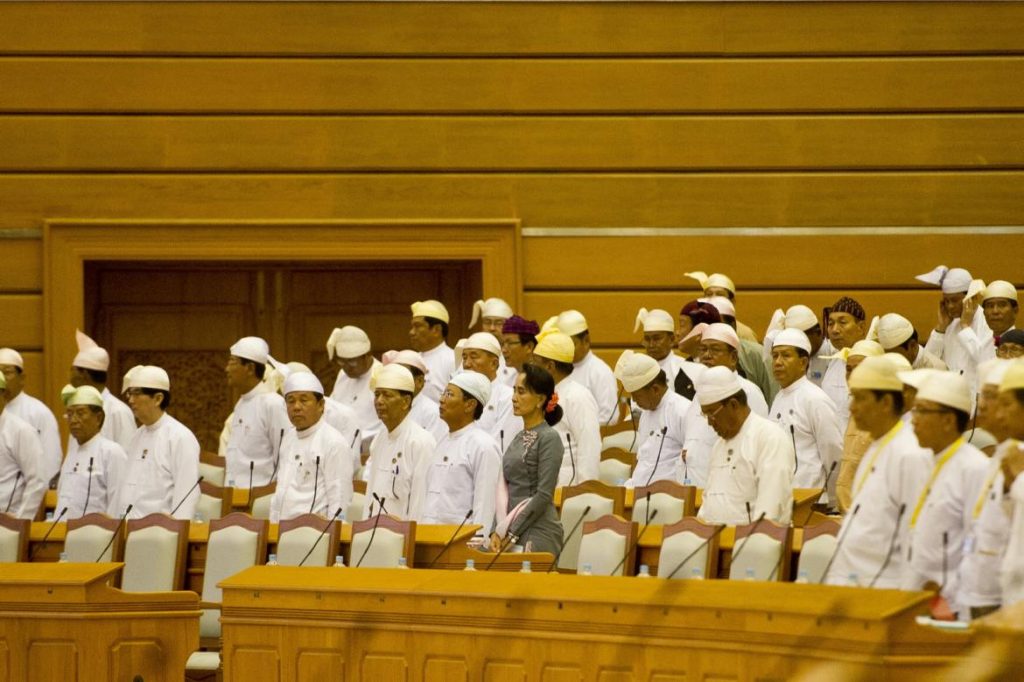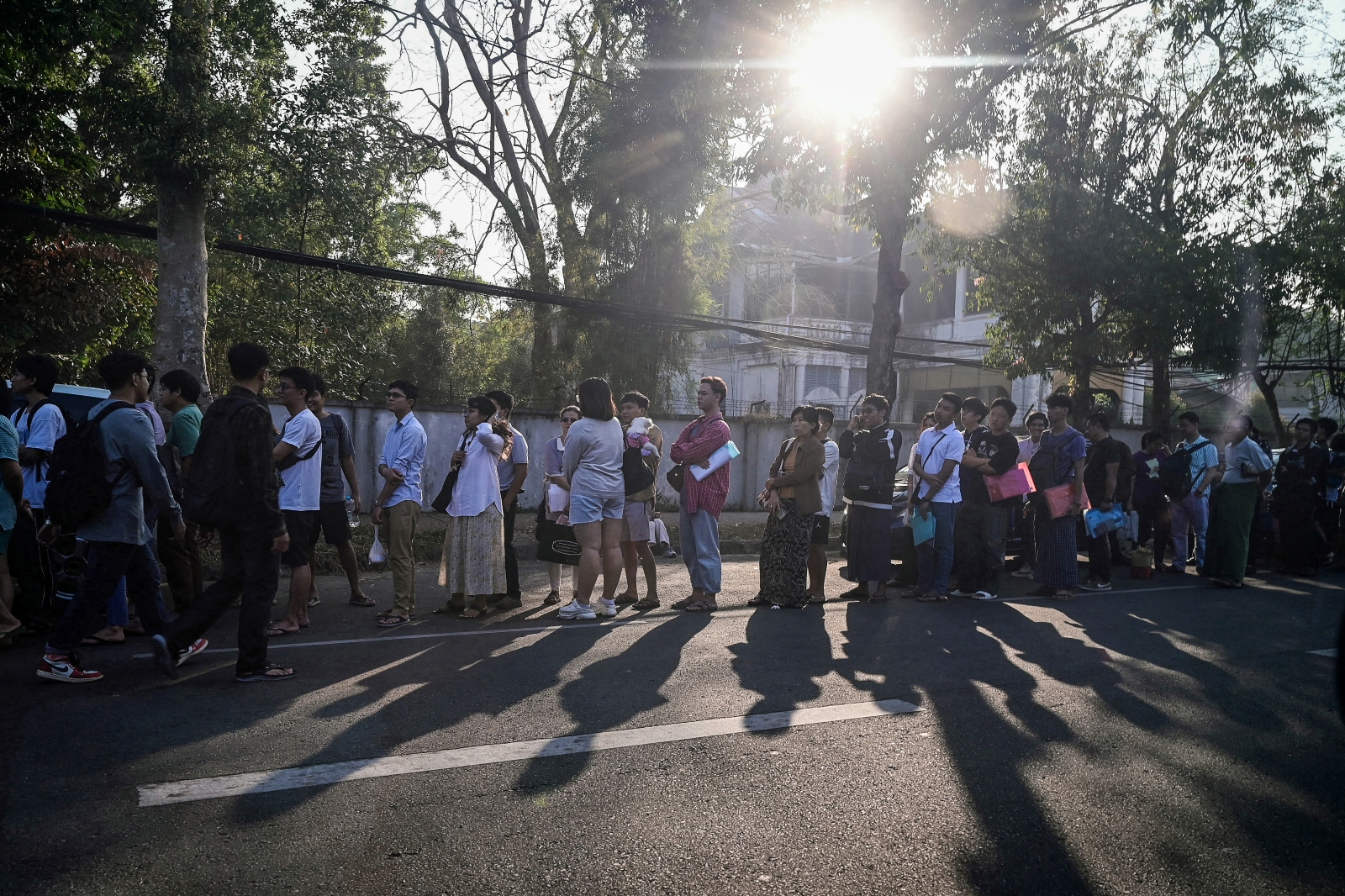An expected deluge of election complaints fails to materialise amid indications of concerted behind-the-scenes efforts to ensure a smooth transition to a National League for Democracy government.
The Union Election Commission has told the Minister for Livestock, Fisheries and Rural Development, U Ohn Myint, to withdraw a complaint against the National League for Democracy candidate who defeated him in the November 8 election.
The UEC has also ordered the outgoing minister’s campaign manager to apologise to MP-elect Daw Aye Mya Mya Myo for having falsely accused NLD supporters of obstructing U Ohn Myint’s campaign activities in Yangon’s Kyauktan Township.
The case is one of the first in which the UEC ordered members of the Union Solidarity and Development Party to withdraw complaints against the NLD in the aftermath of its landslide victory on November 8.
In the aftermath of the USDP rout, its defeated MPs lodged a barrage of complaints with the UEC that they apparently expected to be upheld.
The complaints against the NLD were headline news before NLD leader Daw Aung San Suu Kyi began a round of high-level meetings to discuss the transition. They began on November 19 with the first of a series of talks with outgoing parliamentary Speaker Thura U Shwe Mann. On December 2, Daw Aung San Suu Kyi held separate meetings with President U Thein Sein and Tatmadaw Commander-in-Chief Senior General Min Aung Hlaing.
Support more independent journalism like this. Sign up to be a Frontier member.
Her first direct talks with the Tatmadaw chief were “crucial for democratisation, national reconciliation and peacemaking,” political analyst Dr Yan Myo Thein was quoted as saying.
After the meetings, reports about election complaints dwindled. Why?
Daw Aung San Suu Kyi, who has often said that she held no grudge against the former military junta, will need to tread carefully with the Tatmadaw as she negotiates a relationship that presumably benefitted from her scheduled meeting with Senior General Min Aung Hlaing, and from her surprise talks with former junta supremo, U Than Shwe, on December 4.
The NLD may have won a crushing victory but Daw Aung San Suu Kyi will need to reach an accommodation with the Tatmadaw if she is to rule “above the president”, as she foreshadowed in a news conference on November 5. Any such accommodation is likely to have been a focus of talks taking place behind the scenes. Reuters news agency on January 15 quoted an unnamed NLD official as saying there had been “a few” previously unreported meetings since the election between Daw Aung San Suu Kyi and Senior General Min Aung Hlaing to discuss the transition to the new government.
It is possible that in building relations with the Tatmadaw the NLD may have to make compromises on some issues. “There has to be give-and-take between Daw Aung San Suu Kyi with U Thein Sein’s government and Senior General Min Aung Hlaing,” said prominent politician, U Thu Wai, the chairman of the Democratic Party (Myanmar).
But it seems that one issue on which the NLD will not compromise is the peace process.
In an interview with Radio Free Asia last week on the sidelines of the Union Peace Conference in Nay Pyi Taw, Daw Aung San Suu Kyi said “the real peace conference” would need to be organised by the next government.
“How can you expect a real peace conference to be completed in five days,” she said, referring to the Nay Pyi Taw gathering.
It was the first time Daw Aung San Suu Kyi had participated in an event involving the peace process, which some in the NLD believe was launched by President U Thein Sein in a bid to win support for the USDP in ethnic minority areas.
The peace process would be the first priority of her administration, Daw Aung Suu Kyi said in a speech at NLD headquarters in Yangon on January 4 to mark Independence Day, at which she indirectly criticised the October 15 ceasefire accord between the government and eight armed ethnic groups.
“We will try for the all inclusive agreement,” she said.
Military-drafted constitution
A priority on which the NLD leader seems to have compromised is amending the clauses in the military-drafted 2008 Constitution that give the Tatmadaw an effective veto over charter change and prevent her from becoming president because family members are foreigners.
“Constitutional amendments are not likely to be the top priority right now,” political analyst U Kyaw Lynn Oo told Frontier.
Constitutional reform, which had long been the NLD’s top priority, was too sensitive to be discussed during the transitional period before the new government assumed office, U Kyaw Lynn Oo said.
Senior General Min Aung Hlaing made clear in an interview with the Washington Post on November 21 that the Tatmadaw was “not ready” to discuss amending Section 436 of the constitution. It gives the unelected Tatmadaw MPs who hold 25 percent of the seats in parliament an effective veto over charter reform because constitutional amendments need the support of more than 75 percent of MPs. The political situation would need to be “mature and stable” before the Tatmadaw would be prepared to consider changes to the constitution, Senior General Min Aung Hlaing said.
Ministerial appointments
Constitutional reform is an issue for the future but a focus of the present is the likely make-up of an NLD government. Daw Aung San Suu Kyi is said to have rebuffed two requests for appointments to her government amid speculation that tycoons to whom she is close have asked to become ministers.
The NLD leader has dismissed criticism that she was too close to some tycoons by saying that cooperation with them would be in the national interest.
Daw Aung San Suu Kyi’s readiness to cooperate with tycoons would be reflected in her government’s policy, said U Kyaw Lynn Oo.
Thura U Shwe Mann
Apart from the appointment of cabinet ministers another issue generating intense interest is the contest for the presidency.
At the General Administration Department of the Ministry of Home Affairs, a backbone of local administration throughout the country, a dozen staff members recently told Frontier they believed Thura U Shwe Mann would become president or vice-president, or be reappointed Speaker.
The NLD’s absolute majority in the next parliament means that it will have the numbers to nominate two of the three presidential candidates, with the third proposed by the military MPs.
But nominating Thura U Shwe Mann would likely involve delicate negotiations with the Tatmadaw, some members of which bitterly resented his decision last year to allow the parliament to debate charter reform, a factor in his unceremonious dumping as chair of the USDP in August.







